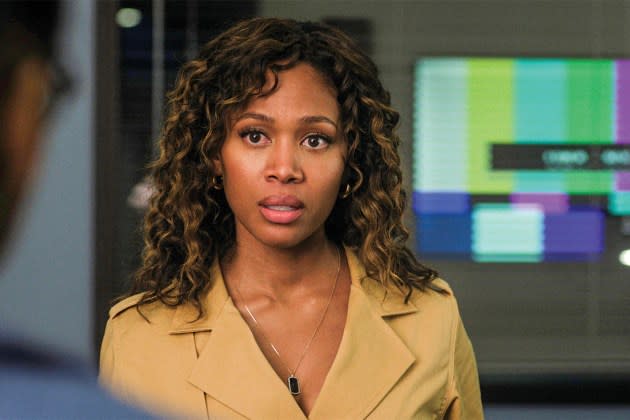‘The Morning Show’ Star Nicole Beharie on the Advice She Got From Gayle King
- Oops!Something went wrong.Please try again later.
- Oops!Something went wrong.Please try again later.

After Nicole Beharie joined the third season of Apple TV+’s The Morning Show, as new anchor Chris Hunter, a pivotal moment in her quick preparation process happened while speaking to CBS Mornings’ Gayle King. Beharie says the veteran newscaster “told me a story about a moment when she felt like the world was on her shoulders and where her identity as a Black woman in this space was heavier than she would like it to be.”
After Beharie revealed some of her trepidation around being a tonal fit for the ensemble and stepping into what she describes as a “well-oiled machine” of a show, King — pointing to her experiences as an anchor — responded, “We don’t have time for that. You are the answer to many people’s dreams, and basically, no one’s really, truly interested in your plight, in a way.”
More from The Hollywood Reporter
Hollywood Flashback: The Cast of 'The Birdcage' Soared at the 1997 SAG Awards
How 'All of Us Strangers' Cinematographer Created a Sense of "Organic Nostalgia" With His Camera
'Barbie' Star America Ferrera on Wrapping Up One of the Biggest Years of Her Career
It’s advice that would help the actress deliver a more restrained but equally potent performance during a key workplace scene that could have been played with a more emotionally explosive twist. That moment finds Beharie and Holland Taylor in a game of dramatic tennis, as their characters conduct an on-air sit-down addressing the racist comments made during Hunter’s hiring process by Taylor’s Cybil Richards, the network’s board chairperson, which were leaked to the press.
“There are so many interviews [of] people navigating difficult conversations with highly intelligent people, and they’re easily disregarded because of skin color. You watch them, and you see the micro-flinching,” Beharie explains, noting that she watched “tons” of that material. “I didn’t go into it thinking it was going to be a ‘gotcha.’ Chris is upset and hurt about it, but she realizes that change doesn’t happen without her stepping up. Doing this interview is a big deal, and it has to be done with care because it’s giving the person the opportunity to make it right — even if they don’t take it.”
Beharie says the scene underwent several script iterations and describes filming it as “a really rough shooting day,” with people out from COVID and the episode’s director helming from a “trailer outside somewhere.” At the time, she wasn’t sure how it would turn out. That changed after it aired and began garnering a kind of response Beharie wasn’t expecting — a “cathartic” reaction that highlights just how Hunter’s big moment had become the answer to people whose dreams of attaining accountability had been denied.
“I have heard from quite a few journalists, people of color, Black people, women, white women, men — all kinds of people that have had to repress whatever they’re going through,” she says. “There’s something about her coming out and having a discussion about something that’s so personal. The one thing that was important to me, though, was to make it not just about her. It was emblematic of a dynamic happening in the culture and in other workplace environments — basically everywhere.”
This story first appeared in a December standalone issue of The Hollywood Reporter magazine. Click here to subscribe.
Best of The Hollywood Reporter

